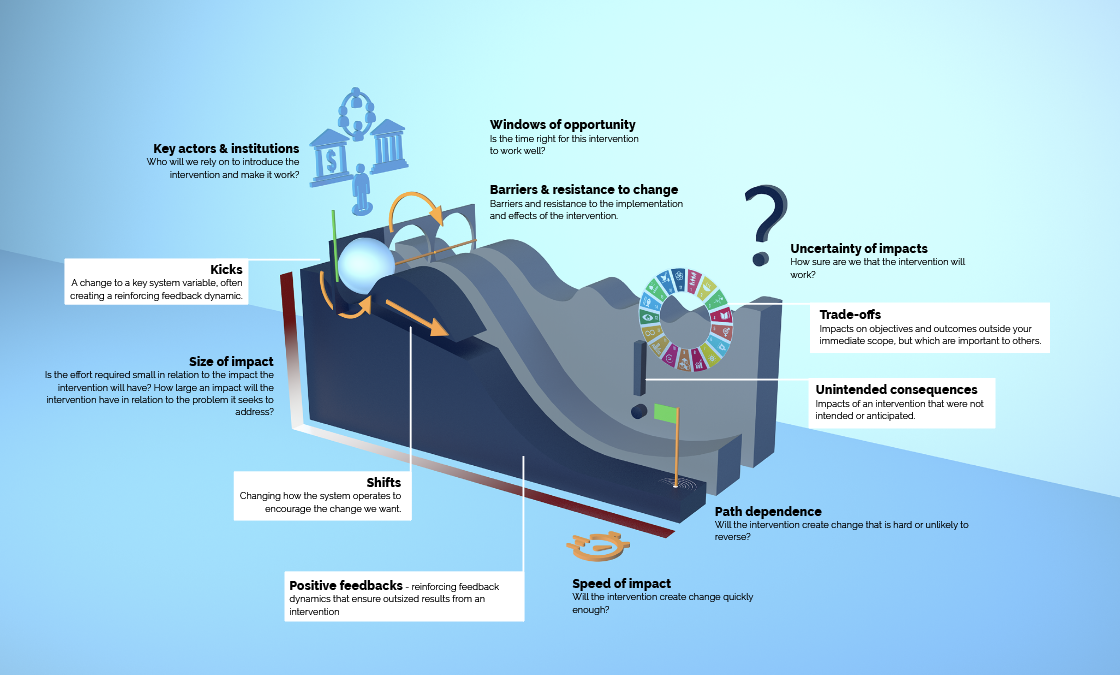Post-carbon transition
Overview
The Oxford Martin Programme on the Post-Carbon Transition aims at developing a richer understanding of complex socioeconomic systems to help policymakers and business leaders identify “sensitive intervention points” or SIPs where modest targeted action can trigger an outsized response. The goal is to move sectors and the wider socioeconomic system past tipping points to where positive, self-reinforcing dynamics take over so that a return to a previous high emissions state becomes very difficult.
Our approach
The core objectives of the programme are to identify, understand, model, and trigger these sensitive intervention points to rapidly transition to a post-carbon society. Each of these objectives is represented by a workstream within the research programme. Achieving these objectives is no small feat, and requires interdisciplinary insights from complex systems science, history, geography, social psychology, politics, philosophy, and economics. Our research is not focussed on producing certainties or single pathways. Rather, the aim is to provide a richer understanding of the possible routes to a post-carbon society, and to provide guidance on the sort of ‘bets’ that policymakers and business leaders could make in order to maximise the probability that we get there.
Defining Sensitive Intervention Points (SIPs)
The Sensitive Intervention Points (SIPs) framework is helpful in bringing together complex systems thinking which is a way of looking at the interconnected relationships within a whole system, rather than analysing a system as individual elements. Although the Post-Carbon Transition programme is utilising this framework to accelerate decarbonisation, SIPs are not limited to the environmental discipline and can be applied to many different topics.
There are two core elements to how SIPs can be triggered:
- a ‘kick’ is when you alter a variable in an existing system that triggers a positive feedback dynamic, for example, a subsidy for green products alters the variable of price.
- a ‘shift’, is where you fundamentally change the rules of the game to completely alter the system. This might include the establishment of an independent body to hold the government accountable to its climate targets or new laws to more stringently monitor the licensing of fossil fuel permits.
If we imagine a socioeconomic system as a landscape of peaks and troughs, in which the system (visualised as ball) is attracted to troughs, a kick can be visualised as forcing the ball over a tipping point (i.e. peak), whereas the shift alters the entire landscape. Our researchers have also identified ‘characteristics’ which are aspects of a SIP that defines the concept and helps to make the framework more practical, all of which can be seen in the graphic below.

If you would like to further explore the SIPs framework, visit the website of our partner programme, Oxford Net Zero, to deep dive into these characteristics and explore potential SIPs.
Our Research
Our research is broken down into the following four workstreams to help identify, understand, model, and trigger sensitive intervention points.
Complexity Economics and sustainability
- Farmer, J.D., Hepburn, C., Mealy, P. et al. A Third Wave in the Economics of Climate Change. Environ Resource Econ 62, 329–357 (2015)
- Horrell, S., Humphries, J., and Weisdorf, J., ‘ Beyond the male breadwinner: Life-cycle living standards of intact and disrupted English working families, 1260–1850’, The Economic History Review, 75 (2022), pp. 530– 60.
- Humphries, Thomas. Insensitive Resistance Points: In Thrall to Coal
- Fisher, L. & Sandberg, A. (2022) A Safe Governance Space for Humanity: Necessary Conditions for the Governance of Global Catastrophic Risks. Global Policy, 00, e13030. Available from: https://doi.org/10.1111/1758-5899.13030
- J. D. Farmer, C. Hepburn, M. C. Ives, T. Hale, T. Wetzer, P. Mealy, R. Rafaty, S. Srivastav, R. Way. “Sensitive Intervention Points in the Post Carbon Transition”, Science, 364(6435), 2019.
- Mealy, P., Barbrook-Johnson, P., Ives, M.C., Srivastav, S., Hepburn, C. (2023). Sensitive Intervention Points: A strategic approach to climate action. INET Oxford Working Paper No. 2023-15 (Forthcoming in the Oxford Review of Economic Policy)
- Barbrook-Johnson, P. et al. (2023). New economic models of energy innovation and transition. Report
Technology and the Green Transition
- Way, R., Ives, M., Mealy, P. & Farmer, J.D. (2021). 'Empirically grounded technology forecasts and the energy transition'. INET Oxford Working Paper No. 2021-01.
- Cesaro, Z. Ives, M. Nayak-Luke, R. Mason, M. Bañares-Alcántara, R. (2021) Ammonia to power: Forecasting the levelized cost of electricity from green ammonia in large-scale power plants, Applied Energy, Volume 282, Part A, 2021, 116009, ISSN 0306-2619, https://doi.org/10.1016/j.apenergy.2020.116009.
- Ives, M., Righetti, L., Schiele, J., De Meyer, K., Hubble-Rose, L., Teng, F., Kruitwagen, L., Tillmann-Morris, L., Wang, T., Way, R., & Hepburn, C. (2021). A new perspective on decarbonising the global energy system. Oxford University Smith School of Enterprise and the Environment.
- Mealy, P. Teytelboym, A. (2020) Economic complexity and the green economy, Research Policy, 103948, ISSN 0048-7333, https://doi.org/10.1016/j.respol.2020.103948
- Hötte, K., Jee, S.J. & Srivastav, S. (2021). 'Knowledge for a warmer world: a patent analysis of climate change adaptation technologies'. INET Oxford Working Paper No. 2021-19
- Kerstin Hötte, Anton Pichler, François Lafond, The rise of science in low-carbon energy technologies, Renewable and Sustainable Energy Reviews, Volume 139, 2021, 110654, ISSN 1364-0321, https://doi.org/10.1016/j.rser.2020.110654
- Cesaro, Z., Bramstoft, R., Ives, M.C. & Bañares-Alcántara, R. (2023). Facilitating deep decarbonization via sector coupling of green hydrogen and ammonia. INET Oxford Working Paper No. 2023-04
Society, Politics and Regulation
- Srivastav, S. & Rafaty, R. (2021). 'Five Worlds of Political Strategy in the Climate Movement'. INET Oxford Working Paper No. 2021-07.
- Kolic, B., Sabuco, J. & Farmer, J.D. (2022) Estimating initial conditions for dynamical systems with incomplete information. Nonlinear Dyn 108, 3783–3805 https://doi.org/10.1007/s11071-022-07365-y
- Benoit, P. Clark, A. Schwarz, M. Dibley, A. Decarbonization in state-owned power companies: Lessons from a comparative analysis, Journal of Cleaner Production, Volume 355, 2022, 131796, ISSN 0959-6526, https://doi.org/10.1016/j.jclepro.2022.131796
- Clark, A. Benoit, P. Walters, J. (2022) Government shareholders, wasted resources and climate ambitions: why is China still building new coal-fired power plants?, Climate Policy, DOI: 10.1080/14693062.2022.2062285
- Srivastav, S. & Rafaty, R. (2022). Political strategies to overcome climate policy obstructionism. Perspectives on Politics
Corporations, Finance and Law
- Rekker, S., Ives, M., Wade, B., Greig, C. & Webb, L. (2021). 'The Paris-compliant company: Measuring transition performance using a strict science-based approach'. INET Oxford Working Paper No. 2021-03. (In review: Nature Communications)
- Lu, Y., Cohen, F., Smith, S.M. et al. Plant conversions and abatement technologies cannot prevent stranding of power plant assets in 2 °C scenarios. Nat Commun 13, 806 (2022). https://doi.org/10.1038/s41467-022-28458-7
- Rekker, S., Chen, G., Heede, R., Ives, M.C., Wade, B. & Greig, C. (2023). Evaluating fossil fuel companies’ alignment with 1.5 °C climate pathways. Nature Climate Change.
- Gasparini, M., Fry, S., Ives, M.C., Carr, B & Beinhocker, E. (2023). Are financial regulations impairing the transition to net zero? INET Oxford Working Paper No. 2023-11.
- Srivastav, S. & Singh, T. (2023). Greening our Laws: Revising Land Acquisition Law for Coal Mining in India. INET Oxford Working Paper No. 2023-07. (Published in Economic and Political Weekly, Vol. 57, Issue No. 46)
Visit the Oxford Martin School website for a full list of publications.
People
- Doyne Farmer | Oxford Martin School
- Cameron Hepburn | Smith School of Enterprise and the Environment
- Ben Caldecott | Smith School of Enterprise and the Environment
- Alex Teytelboym | Oxford Martin School
- Thomas Hale | Oxford Martin School
- Jane Humphries | Oxford Martin School
- Anders Sandberg | Oxford Martin School
- Myles Allen | Oxford Martin School
- Matthew Ives | Smith School of Enterprise and the Environment
- Lucas Kruitwagen | Smith School of Enterprise and the Environment
- Peter Barbrook-Johnson | Smith School of Enterprise and the Environment
- François Lafond | Oxford Martin School
- Arabella Miller-Wang | Institute for New Economic Thinking
- Ryan Rafaty | Institute for New Economic Thinking
- Rupert Way | Smith School of Enterprise and the Environment
- Thom Wetzer | Smith School of Enterprise and the Environment
- Sugandha Srivastav | Institute for New Economic Thinking
- Andrea Bacilieri | Institute for New Economic Thinking
- Lennart Baumgärtner| Institute for New Economic Thinking
- Anna Berryman | Institute for New Economic Thinking
- Joris Bücker | Institute for New Economic Thinking
- Alex Clark | School of Geography and the Environment
- Matteo Gasparini | Institute for New Economic Thinking

